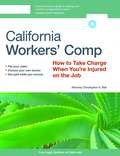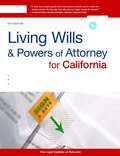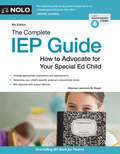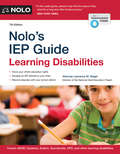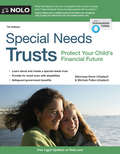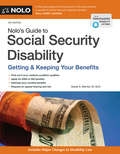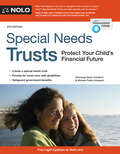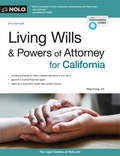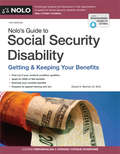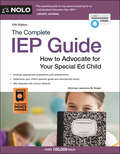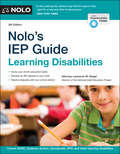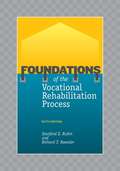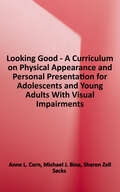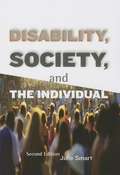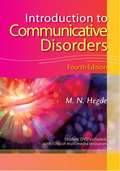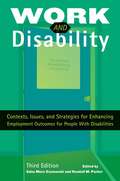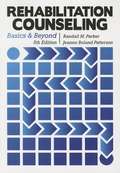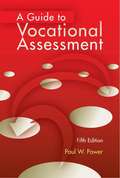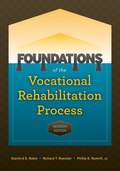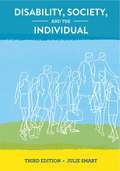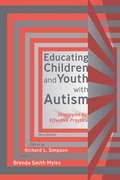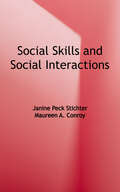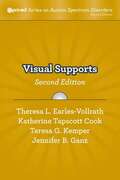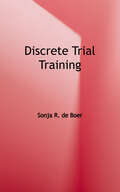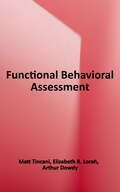- Table View
- List View
California Workers' Comp: How to Take Charge When You're Injured on the Job
by Christopher BallMore than a million Californians a year suffer job-related injuries or illness. For many, receiving compensation can be a nightmare, since recent laws give employers and insurance companies far greater rights and employees fewer medical benefits. California Workers' Comp shows how to handle a California workers' compensation claim from start to finish. This plain-English guide, explains how to work with the insurance company to receive the medical treatment and benefits. Workers will find out how to: file a claim protect their legal rights receive the medical care they need get the benefits they're entitled to deal with uncooperative employers, doctors, and insurance agencies negotiate a settlement present their case before a judge This complete guide can help people handling their own claims or filing on a minor or other's behalf. This edition is completely updated to cover significant changes in the area of permanent disability ratings, along with recent updates to the Labor Code and other workers' comp laws. A comprehensive chapter is included for computer users with repetitive strain injuries.
Living Wills and Powers of Attorney for California
by Shae Irving J.D.A serious accident or illness can happen to anyone at any time. That’s why everyone should have these essential documents: An advance health care directive (also called a living will and durable power of attorney for health care), which lets you state your wishes for end-of-life medical care and name a trusted person who will work with your doctors to be sure you get the kind of care you want. A durable power of attorney for finances, which lets you appoint someone you trust to manage your finances for you if you no longer can. The book explains how to create these forms to comply with California law, and how they can be used to help your family. The book also contains instructions for obtaining a Do Not Resuscitate (DNR) order or a Physician Orders for Life-Sustaining Treatment (POLST) form, either of which can be used to let emergency medical responders know that you don’t want certain extreme measures to be used to revive you.
Complete IEP Guide, The: How to Advocate for Your Special Ed Child
by Lawrence M. SiegelPut the law on your child's side Federal law guarantees every child a free, appropriate education, and the goal of the Individualized Education Program (IEP) is to assure that every child with special needs receives what the law promises. But if you have a special ed child, you know that your family must make sure the school follows through. This powerful book covers: eligibility rules and assessments working with outside experts developing your child's ideal educational program preparing for and attending IEP meetings develop a blueprint of program and services, and resolving disputes with school districts. Whether you're new to the IEP process or entering it once again, this user-friendly, plain English guide is your outline for an effective educational experience for your child. This edition of The Complete IEP Guide provides key forms, sample letters and resources you need at every stage of the IEP process. With it, you can make sure your child gets a good education—the education he or she deserves.
Nolo's IEP Guide: Learning Disabilities
by Lawrence SiegelHow to advocate for your child's education. According to the National Center for Learning Disabilities, 2.4 million children in the U.S. are diagnosed with learning disabilities – and these children have unique educational needs. While federal law entitles each of these children to an “appropriate” education, making sure teachers and school administrators are addressing a child’s special needs and providing the proper services can feel like an uphill battle. This book will help guide you through your child’s IEP process by explaining your child’s rights and teaching you how to draft educational goals and objectives, research school programs and alternatives, prepare for IEP meetings, and resolve disputes with your school district. Learn how to : identify a learning disability understand your child's rights to education untangle eligibility rules and evaluations prepare and make your best case to school administrators develop IEP goals and advocate for their adoption, explore and choose the best programs and services. Nolo's IEP Guide: Learning Disabilities is written by an expert who's fought for kids for many years.
Special Needs Trusts: Protect Your Child's Financial Future
by Kevin Urbatsch Michele Fuller-UrbatchSpecial Needs Trusts shows you how to leave any amount of money to your disabled loved one -- without jeopardizing government benefits. It provides plain-English information and forms you need to create a special needs trust. Funds in a special needs trust can make a big difference in quality of life by paying for: annual independent check-ups personal care attendant or escort vehicles and transportation insurance rehabilitation essential dietary needs materials for recreation trips or vacations entertainment athletic training or competitions, and much more. Special Needs Trusts also provides a formal letter to the trustee, which explains this very important role, and a personal letter to the trustee, which provides crucial information about your loved one. Author Kevin Urbastch gives you an experienced perspective about when to make a special needs trust on your own and when to seek the services of an attorney. This edition has been thoroughly revised to provide: current eligibility requirements for government benefits helpful resources a new chapter on letters of intent a new chapter on ABLE accounts
Nolo's Guide to Social Security Disability: Getting & Keeping Your Benefits
by David A. Morton IIINolo's Guide to Social Security Disability covers the criteria for getting disability benefits for back problems, heart and cardiovascular disease, diabetes, cancer, autoimmune diseases, mental issues like depression and anxiety, and 200 more medical conditions. Learn how to match the medical details of your disability to Social Security regulations to make sure you have the right evidence to qualify for the benefits you're due when you apply. This guide is written by a former Chief Medical Consultant for the Social Security Administration whose expert deciphering of the medical portions of SSA regulations will help you understand how you can get benefits. If you've been denied benefits already, this book will tell you how to find out why and what steps to take to prove that you should get benefits on appeal. This edition is completely updated with the latest rules and information plus updated figures for 2018 and many updated medical listings.
Special Needs Trusts: Protect Your Child's Financial Future
by Kevin Urbatsch Michele Fuller-UrbatchLeave money to a loved one with a disability—without losing benefits Use a special needs trust to provide financial security for your child (or anyone) with a disability, without jeopardizing important government benefits. Funds in a special needs trust do not count against eligibility for benefits and can be used to improve the quality of your child’s life. This book provides everything you need to know about special needs trusts—whether you make one yourself or have an attorney draft one for you. The authors explain: how special needs trusts work the trustee’s role ways to pass important information to successor trustees the pros and cons of joining a pooled trust, and creating special needs trust with or without a lawyer. This edition is thoroughly updated and includes new chapters on ABLE accounts and letters of intent. All forms are downloadable through a special link in the book.
Living Wills and Powers of Attorney for California
by Shae IrvingA serious accident or illness can happen to anyone at any time. That’s why everyone should have these essential documents: An advance health care directive (also called a living will and durable power of attorney for health care), which lets you state your wishes for end-of-life medical care and name a trusted person who will work with your doctors to be sure you get the kind of care you want. A durable power of attorney for finances, which lets you appoint someone you trust to manage your finances for you if you no longer can. The book explains how to create these forms to comply with California law, and how they can be used to help your family. The book also contains instructions for obtaining a Do Not Resuscitate (DNR) order or a Physician Orders for Life-Sustaining Treatment (POLST) form, either of which can be used to let emergency medical responders know that you don’t want certain extreme measures to be used to revive you. Includes forms for both medical care and finances. New edition is fully updated for 2018.
Nolo's Guide to Social Security Disability: Getting & Keeping Your Benefits
by David A. Morton IIIQualify for Social Security disability benefits, quickly and easily Nolo's Guide to Social Security Disability covers the criteria for getting disability benefits for back problems, heart and cardiovascular disease, diabetes, cancer, autoimmune diseases, mental issues like depression and anxiety, and 200 other medical conditions. Learn how to match the medical details of your disability to Social Security regulations to make sure you have the right evidence to qualify for the benefits you're due when you apply. This guide is written by a former Chief Medical Consultant for the Social Security Administration whose expert deciphering of the medical portions of SSA regulations will help you understand how you can get benefits. If you’ve been denied benefits already, this book will tell you how to find out why and what steps to take to prove that you should get benefits on appeal. This edition is completely updated with the latest rules and information plus updated figures for 2020 and many updated medical listings.
Complete IEP Guide, The: How to Advocate for Your Special Ed Child
by Lawrence M. SiegelRecipient of the 2017 BRONZE Winner for Education Award from Foreword Indies. Get the educational services and support your child deserves Federal law guarantees every child a free appropriate education, and the goal of the Individualized Education Program (IEP) is to assure that every child with special needs receives what the law promises. But if you have a special ed child, you know that your family must make sure the school follows through. This powerful book covers: eligibility rules and assessments working with outside experts developing your child's ideal educational program preparing for and attending IEP meetings, and resolving disputes with school districts. The 10th edition includes summaries of important court decisions, expanded information on independent evaluations and bullying, and additional real-life tips. It provides key forms, sample letters, and resources you need at every stage of the IEP process. With it, you can make sure your child gets a good education—the education he or she deserves. With downloadable forms, letters and resources inside. Includes IEP blueprint.
Nolo's IEP Guide: Learning Disabilities
by Lawrence SiegelHow to advocate for your child’s education Many children have learning disabilities—and it’s up to parents and schools to work together to ensure that each child’s unique educational needs are met. But what if the school disagrees with your goals for your child? You are at a disadvantage if you don’t know the law. This book teaches you to: identify a learning disability understand your child's rights to education untangle eligibility rules and evaluations prepare and make your best case to school administrators develop IEP goals and advocate for their adoption, and explore and choose the best programs and services. Written by an expert who’s fought for kids for many years, the 8th edition includes summaries of important court decisions and expanded information on independent evaluations and bullying, and provides the forms, sample letters, resources, and encouragement you need. With Downloadable Forms: download forms, letters and resources (details inside).
Foundations of the Vocational Rehabilitation Process (6th edition)
by Richard Roessler Stanford E. RubinIn this sixth edition guide for professionals in vocational rehabilitation (as well as families and individuals who want to understand and participate in planning rehabilitation), Rubin (emeritus, rehabilitation, Southern Illinois University) and Roessler (rehabilitation, human resources and communication, University of Arkansas) discuss government and societal acts concerning the disabled and what should be considered reasonable goals. Then they treat the clients, their needs, and the role of the counselor and give concrete advice on evaluation, support services, jobs, and independent living. There is also a chapter on the particular problems faced by women with disabilities. A clear and useful guide. Annotation ©2008 Book News, Inc., Portland, OR (booknews.com)
Looking Good
by Anne L. Corn Sharon Zell Sacks Michael J. BinaA Curriculum on Physical Appearance and Personal Presentation for Adolescents and Young Adults With Visual Impairments
Disability, Society and the Individual (2nd Edition)
by Julie SmartThe purpose of this book is to look at the disability experience from the perspective of the individual who has a disability, to discuss how disabilities are viewed by society, and to consider the relationship between these two viewpoints.
Introduction to Communicative Disorders (4th edition)
by M. N. HegdeIn this update of the 2001, 1995, and 1991 editions, Hegde (communication sciences and disorders, California State U. , Fresno) introduces the rapidly growing science of communication and profession of communicative disorders. Coverage includes a new chapter on literacy skills in children and the role of the speech-language pathologist in literacy intervention; profiles of speech-language pathologists and audiologists; and expanded material on audiology, audiology rehabilitation, and disorders of swallowing. The text includes study questions; information on professional education, organizations, and standards; a glossary.
Work and Disability: Contexts, Issues, and Strategies for Enhancing Employment Outcome for People With Disabilities (Third Edition)
by Randall M. Parker Edna Mora Szymanski<p>Work is a central aspect of human life in every culture and every society. In certain societies work may be a means by which individuals define themselves and/or maintain their quality of life. However, as a whole, work is the essential means by which we all attain our basic needs such as food and water. <p>In our modern society, persons with disability face a society in which jobs and education are not as easily accessible or attainable. Disability often complicates the delicate interrelationships between people and work. It may affect work productivity, relationships with coworkers, and relationships at home. <p>This third edition covers the latest in legislative background and other contextual matters regarding employment of people with disabilities; vocational theories and research related to disability; counseling interventions, multicultural issues, vocational assessment, labor market information, and accommodation of people with disabilities in the workplace; job placement and job development; outreach through business consultation; and supported employment for individuals with developmental disabilities.</p>
Rehabilitation Counseling: Basics And Beyond
by Randall M. Parker Jeanne Boland PattersonThe purpose of this text is to provide both a basic foundation for students beginning their journey into the profession of rehabilitation counseling and a broad-based reference for current practitioners. The contents provide a conceptual overview of the profession, history, theory, research, and applied foundations of rehabilitation counseling.
A Guide to Vocational Assessment 5th Edition
by Paul W. PowerThis fifth edition of A Guide to Vocational Assessment acknowledges the changes in social and economic systems facing adults with disabilities. It suggests multiple evaluation approaches and insights that can be used to change the difficult to the possible and eventually to the probable. While many chapters underscore the use of traditional evaluation approaches, other chapters operationalize vocational assessment as an individualized, creative, empowering, holistic process and experience of self-discovery.
Foundations Of The Vocational Rehabilitation Process
by Richard Roessler Stanford E. Rubin Phillip D. RumrillThe seventh edition of Foundations of the Vocational Rehabilitation Process provides historical, philosophical, legislative, and sociological foundations for the habilitation/rehabilitation of persons with disabilities. A thorough and current introduction to the American vocational rehabilitation process, this edition addresses mandates presented in the current major pieces of disability legislation influencing the practice of rehabilitation.This book presents theoretical and practical assistance in translating those mandates into positive action. It is this dual process of individual and environmental proactivity that can maximize the rehabilitation of disabled individuals. Not just for the dedicated rehabilitation counselor, this book is also for students attending an introductory course at the master's- or senior-level and in-service directors who design informative training programs. New in the seventh edition:Updated chapter on how "The Americans with Disabilities Act" (ADA), as amended in 2008, prohibits discrimination on the basis of disability in employment, public services, accommodations, and telecommunications. Updated section on the right to medical treatment in light of the 2012 "Affordable Care Act" (ACA). New information and updated references were added on the five disability types--physical disabilities, emotional disorders, intellectual disabilities, learning disabilities, and visual impairments and blindness. Now includes more than 1300 references, 300 of which are new.
Disability, Society, and the Individual
by Julie SmartThis unique book provides a comprehensive examination of the disability experience. The content focuses on definitions of disability, societal response to people with disabilities, and the experience of disability from the perspectives of individuals with disability. It is organized around broad themes rather than disability categories. With an engaging writing style and extensive and completely updated references, Disability, Society, and the Individual-Third Edition prepares the reader to understand and be able to use complex, important, and new ideas surrounding disability -- its experience and social and cultural context. The text includes discussion questions, learning activities, suggested readings, and first-person accounts. PART I--Definitions of Disability PART II--Society and Disability PART III--The Individual and Disability
Educating Children And Youth With Autism: Strategies For Effective Practice
by Brenda Smith Myles Richard L. SimpsonChildren and youth with autism spectrum disorders (ASD) have highly distinctive and idiosyncratic needs and characteristics. ASD is an especially challenging and perplexing disability. The need for knowledgeable and skilled educational professionals was the primary motivation for preparing this third edition of Educating Children and Youth With Autism: Strategies for Effective Practice. This edition includes chapters written by internationally recognized authorities on ASD.
Social Skills and Social Interactions
by Maureen A. Conroy Janine Peck StichterSocial Skills and Social Interactions is written to enhance the quality and quantity of social interactions of individuals with autism spectrum disorder (ASD) and their peers. The text describes social competence and peer-related social behaviors, a multisource functional approach to assessment, and evidence-based practices for fostering peer-related social interactions. This book provides a systematic process for educators to assess, plan for, and support students' social behaviors with peers in the classroom.
Visual Supports
by Theresa L. Earles-VollrathVisual supports are essential components of programs serving students with autism spectrum disorders (ASD) and can help provide a variety of information that enables these students to better understand and complete tasks with greater independence. Visual Supports, Second Edition provides information to help educators and families utilize visual displays or cues, such as schedules, boundaries, labels, and consequence maps, to help students with ASD achieve improved learning outcomes. Contents 1. Creating Visual Supports for Students With Autism Spectrum Disorders 2. Visual Supports That Provide Information 3. Visual Strategies That Support Behavior and Emotional Regulation 4. Visual Supports That Structure the Learning Environment 5. Visual Supports That Enhance Cognition and Language Development 6. Visual Supports That Enhance Comprehension of Classroom Instruction 7. Visual Strategies That Support Conversation and Social Skills
Discrete Trial Training
by Sonja R. DeBoerDiscrete trial training (DTT) is a method of teaching individuals with autism spectrum disorder (ASD) based on applied behavior analysis (ABA). Skills are broken into discrete steps and then taught in massed trials. With DTT, steps are taught one at a time, instead of teaching an entire skill all at once. Concepts covered include errorless learning, methods of reinforcement, and how to use behavior momentum. The text explains how to collect, interpret, and use data to make teaching decisions. Finally, the text details a method for evaluating implementation of DTT.
Functional Behavioral Assessment
by Matt Tincani Elizabeth R. Lorah Arthur DowdyDescribes how to conduct functional behavioral assessment (FBA) as an information-gathering process to develop successful function-based intervention plans for children and youth with autism spectrum disorder (ASD)
